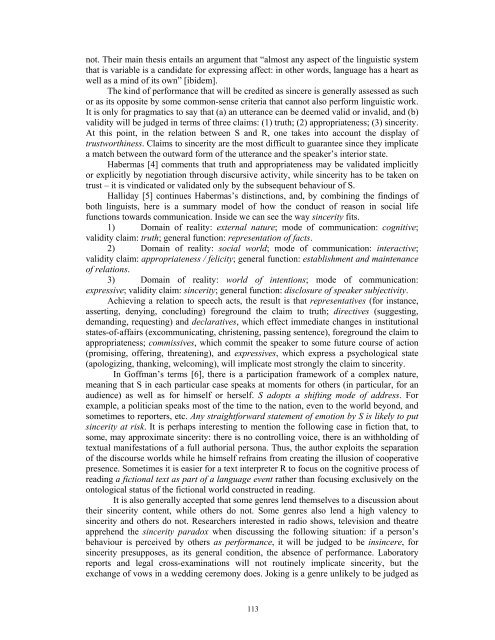PDF. - full text
PDF. - full text
PDF. - full text
Create successful ePaper yourself
Turn your PDF publications into a flip-book with our unique Google optimized e-Paper software.
not. Their main thesis entails an argument that “almost any aspect of the linguistic system<br />
that is variable is a candidate for expressing affect: in other words, language has a heart as<br />
well as a mind of its own” [ibidem].<br />
The kind of performance that will be credited as sincere is generally assessed as such<br />
or as its opposite by some common-sense criteria that cannot also perform linguistic work.<br />
It is only for pragmatics to say that (a) an utterance can be deemed valid or invalid, and (b)<br />
validity will be judged in terms of three claims: (1) truth; (2) appropriateness; (3) sincerity.<br />
At this point, in the relation between S and R, one takes into account the display of<br />
trustworthiness. Claims to sincerity are the most difficult to guarantee since they implicate<br />
a match between the outward form of the utterance and the speaker’s interior state.<br />
Habermas [4] comments that truth and appropriateness may be validated implicitly<br />
or explicitly by negotiation through discursive activity, while sincerity has to be taken on<br />
trust – it is vindicated or validated only by the subsequent behaviour of S.<br />
Halliday [5] continues Habermas’s distinctions, and, by combining the findings of<br />
both linguists, here is a summary model of how the conduct of reason in social life<br />
functions towards communication. Inside we can see the way sincerity fits.<br />
1) Domain of reality: external nature; mode of communication: cognitive;<br />
validity claim: truth; general function: representation of facts.<br />
2) Domain of reality: social world; mode of communication: interactive;<br />
validity claim: appropriateness / felicity; general function: establishment and maintenance<br />
of relations.<br />
3) Domain of reality: world of intentions; mode of communication:<br />
expressive; validity claim: sincerity; general function: disclosure of speaker subjectivity.<br />
Achieving a relation to speech acts, the result is that representatives (for instance,<br />
asserting, denying, concluding) foreground the claim to truth; directives (suggesting,<br />
demanding, requesting) and declaratives, which effect immediate changes in institutional<br />
states-of-affairs (excommunicating, christening, passing sentence), foreground the claim to<br />
appropriateness; commissives, which commit the speaker to some future course of action<br />
(promising, offering, threatening), and expressives, which express a psychological state<br />
(apologizing, thanking, welcoming), will implicate most strongly the claim to sincerity.<br />
In Goffman’s terms [6], there is a participation framework of a complex nature,<br />
meaning that S in each particular case speaks at moments for others (in particular, for an<br />
audience) as well as for himself or herself. S adopts a shifting mode of address. For<br />
example, a politician speaks most of the time to the nation, even to the world beyond, and<br />
sometimes to reporters, etc. Any straightforward statement of emotion by S is likely to put<br />
sincerity at risk. It is perhaps interesting to mention the following case in fiction that, to<br />
some, may approximate sincerity: there is no controlling voice, there is an withholding of<br />
<strong>text</strong>ual manifestations of a <strong>full</strong> authorial persona. Thus, the author exploits the separation<br />
of the discourse worlds while he himself refrains from creating the illusion of cooperative<br />
presence. Sometimes it is easier for a <strong>text</strong> interpreter R to focus on the cognitive process of<br />
reading a fictional <strong>text</strong> as part of a language event rather than focusing exclusively on the<br />
ontological status of the fictional world constructed in reading.<br />
It is also generally accepted that some genres lend themselves to a discussion about<br />
their sincerity content, while others do not. Some genres also lend a high valency to<br />
sincerity and others do not. Researchers interested in radio shows, television and theatre<br />
apprehend the sincerity paradox when discussing the following situation: if a person’s<br />
behaviour is perceived by others as performance, it will be judged to be insincere, for<br />
sincerity presupposes, as its general condition, the absence of performance. Laboratory<br />
reports and legal cross-examinations will not routinely implicate sincerity, but the<br />
exchange of vows in a wedding ceremony does. Joking is a genre unlikely to be judged as<br />
113












